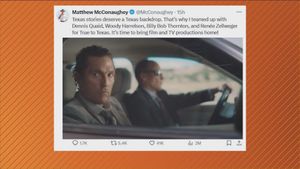Ethan Suplee, known for his role on "+My Name Is Earl," has waded fiercely and articulately through the controversial waters of celebrity weight loss, particularly concerning the medication Ozempic. This drug, which has whipped up considerable attention for its impressive effects on weight loss, has faced scrutiny, especially from those like Suplee who have experienced significant transformations through hard work rather than reliance on medication.
The 48-year-old actor, who once weighed around 550 pounds and has since shed nearly 300 pounds, shared his views candidly, stating to Daily Mail, "Ozempic is a fad diet... I think it's irresponsible for people in Hollywood to be doing [using this drug]." His concerns focus primarily on how its use is portrayed in celebrity culture, with many stars seemingly turning to the medication as the latest shortcut to slimness.
One prominent name who recently admitted to using Ozempic is Oprah Winfrey, who reported losing about 50 pounds after decades of battling her weight. This admission not only surprised many fans but also raised eyebrows since Winfrey had previously criticized the use of medication for weight loss as taking the "easy way out." Suplee has reservations about celebrities using Ozempic, particularly because he believes it trivializes the struggles faced by those who truly need it for health purposes due to clinical obesity.
"Listen, when I was a kid. I dreamed of them finding a weight loss drug… those drugs didn’t even exist when I lost weight," Suplee remarked. His weight loss experience has been a long and complex one, entailing natural methods rather than medical intervention. Despite succeeding significantly with his weight management, he has not shied away from describing the emotional toll associated with weight loss. He noted, "I thought my enlightenment would come through losing weight and so every time I lost a lot of weight and there was no internal change. It was terrifically disappointing to me and I found myself gaining weight again.”
His criticism extends to other celebrities rumored to have utilized Ozempic, including Christina Aguilera and Kelly Clarkson. Aguilera sparked speculation after a noticeable change when performing, and Clarkson, who previously attributed her transformation to walking more and cutting carbs, confirmed her use of weight loss drugs last May.
Suplee stresses the importance of the sustainability of weight loss. He explains the danger of rapid weight loss diets, saying, "They’ll go on these diets... but they’re not sustainable and then the weight returns. I think the availability of these drugs for non-clinically obese individuals can exacerbate this unhealthy yo-yo effect.”
His concerns lie particularly with those who are not clinically obese yet pursue the use of such medications to lose mere 5 to 10 pounds. "Every time they lose weight, they’re also losing lean tissue,” Suplee elaborated, warning of the long-term physiological consequences. He adds, "That is my fear with those drugs... I think it’s irresponsible for people in Hollywood to be promoting them."
While celebrities flaunt these weight loss methods, Suplee highlights his realization during his weight loss odyssey: achieving one's goal weight isn't the finish line for overall well-being. "If you look at your weight and you go like, 'I just need to lose 100lbs, and you set up this finish line, well, what happens when you lose the 100lbs? What's next, you know?"
Acknowledging the continuous struggle against food compulsion and behaviors, Suplee states he's now more content than ever at 260 pounds but recognizes the importance of maintaining focus on healthy habits rather than achieving any final goal. “There is no finish line. This is just a forever story,” he said with newfound wisdom, emphasizing the daily commitment required to stay healthy.
This reflective and candid perspective from Suplee shines light on the broader conversation surrounding Ozempic, weight loss medications, and the superficial allure of quick fixes perpetuated by celebrity culture. Is the chase for the perfect body worth the potential repercussions? One can only hope the dialogue continues as more voices like Suplee's emerge to advocate for long-term health over fleeting aesthetics.



